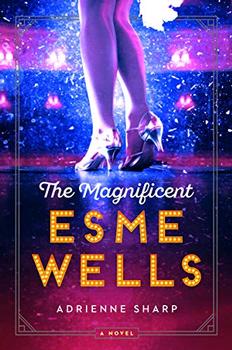Summary | Excerpt | Reading Guide | Reviews | Beyond the Book | Read-Alikes | Genres & Themes | Author Bio

This article relates to The Magnificent Esme Wells
The Flamingo Hotel, opened by Bugsy Siegel in 1946, where Esme spends her teenage years, was the third gambling establishment to open on the Strip. It is now Las Vegas' oldest hotel.
 The hotel had been the brainchild of Billy Wilkerson, who envisioned a European-style hotel and casino, a far cry from the rustic, western-themed establishments that were already present in Vegas. After running into budget problems, Wilkerson accepted one million dollars from a group of New York gangsters headed by Meyer Lansky, and granted them control over two-thirds of the casino.
The hotel had been the brainchild of Billy Wilkerson, who envisioned a European-style hotel and casino, a far cry from the rustic, western-themed establishments that were already present in Vegas. After running into budget problems, Wilkerson accepted one million dollars from a group of New York gangsters headed by Meyer Lansky, and granted them control over two-thirds of the casino.
At this point, Lansky appointed Benjamin "Bugsy" Siegel to run the hotel for him and to make him a profit. So Siegel began supervising the construction of the casino.
Siegel was a notorious mobster who had built a criminal empire through bootlegging, gambling, and assassination in Brooklyn before moving to Vegas. In Brooklyn, Siegel had, along with Meyer Lansky, established Murder, Inc., a syndicate of Jewish mobsters that ran a group of contract killers. Siegel had played a large part in killing off a number of New York's veteran gangsters. In 1937, he set up bootlegging and gambling operations in California, and dabbled in prostitution and narcotics.
In 1945, Siegel moved to Vegas with his girlfriend Virginia Hill, and set about building a new and improved gambling operation. When he first arrived, Siegel purchased the El Cortez hotel with the intent of expanding it and building his empire there. But facing antagonistic public officials who had knowledge of his extensive criminal background, he sold the El Cortez for a profit and began looking for other opportunities. At this point, Siegel got wind of Wilkerson's financial troubles at the Flamingo Hotel and bought it cheaply, making it the cornerstone of his operation.
After Siegel's extravagant vision raised construction costs from $1.5 million to $6 million, the grand opening of the Flamingo Hotel was brought forward in an effort to raise funding for remaining construction. Though highlighted with well-known entertainment, bad weather and a lack of completed hotel rooms meant the opening was a bust. In the first week alone, the casino lost $300,000. After two weeks of operation, it closed down to finish construction.
It re-opened later in 1947 as "The Fabulous Flamingo," and began making a profit. The hotel was uniquely opulent, featuring a golf course; tennis, squash, badminton, and handball courts; and extensive landscaping. Imported palm trees helped to give it the feel of an oasis in the desert.
But before Siegel could enjoy the benefits, he was murdered. In June of 1947, he was shot and killed in his home in Beverly Hills. Though it was never proven, it is believed that Meyer Lansky had him killed over the inflated construction costs, which were allegedly largely due to Siegel's theft and mismanagement. Lansky later said that if it had been up to him, Siegel never would have been killed. He always denied responsibility for the crime.
Minutes after the murder, three of Lansky's partners entered the hotel and assumed full control. For more than a decade afterward, Lansky and his partners made a profit off of the enterprise.
The hotel still exists today, under the name The Flamingo Las Vegas, owned and operated by Caesars Entertainment. It features a 77,000 square-foot casino. Viva Las Vegas and the original Ocean's 11 both had scenes shot in the hotel, which has come to represent the glorified days of 1950s Las Vegas.
Picture of Flamingo Hotel by laslovarga
Filed under Places, Cultures & Identities
![]() This "beyond the book article" relates to The Magnificent Esme Wells. It originally ran in May 2018 and has been updated for the
April 2019 paperback edition.
Go to magazine.
This "beyond the book article" relates to The Magnificent Esme Wells. It originally ran in May 2018 and has been updated for the
April 2019 paperback edition.
Go to magazine.
Your guide toexceptional books
BookBrowse seeks out and recommends the best in contemporary fiction and nonfiction—books that not only engage and entertain but also deepen our understanding of ourselves and the world around us.